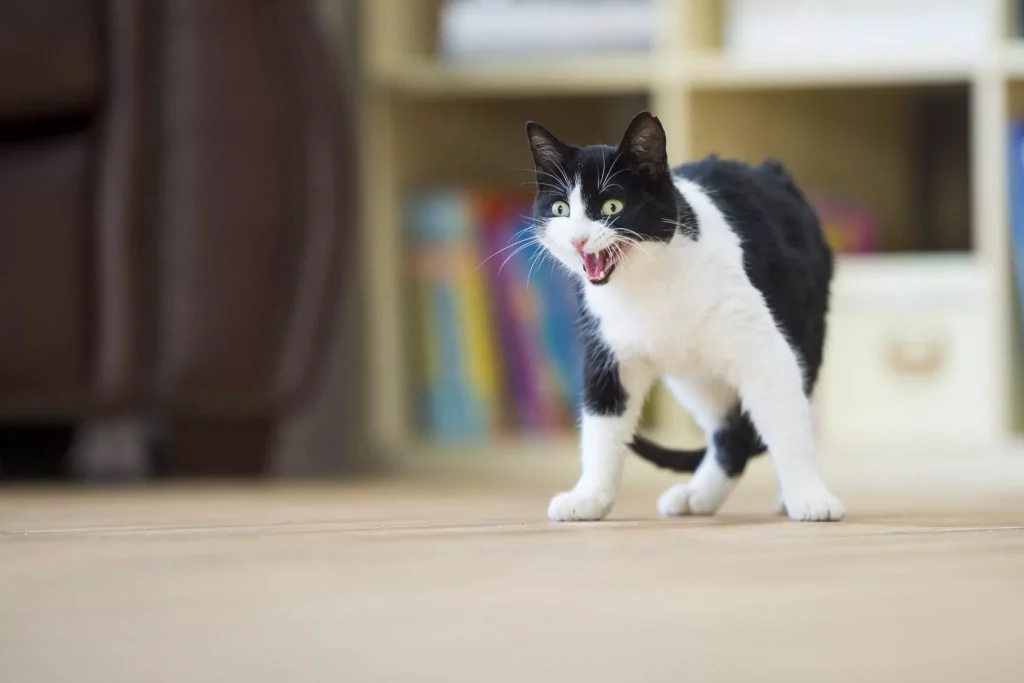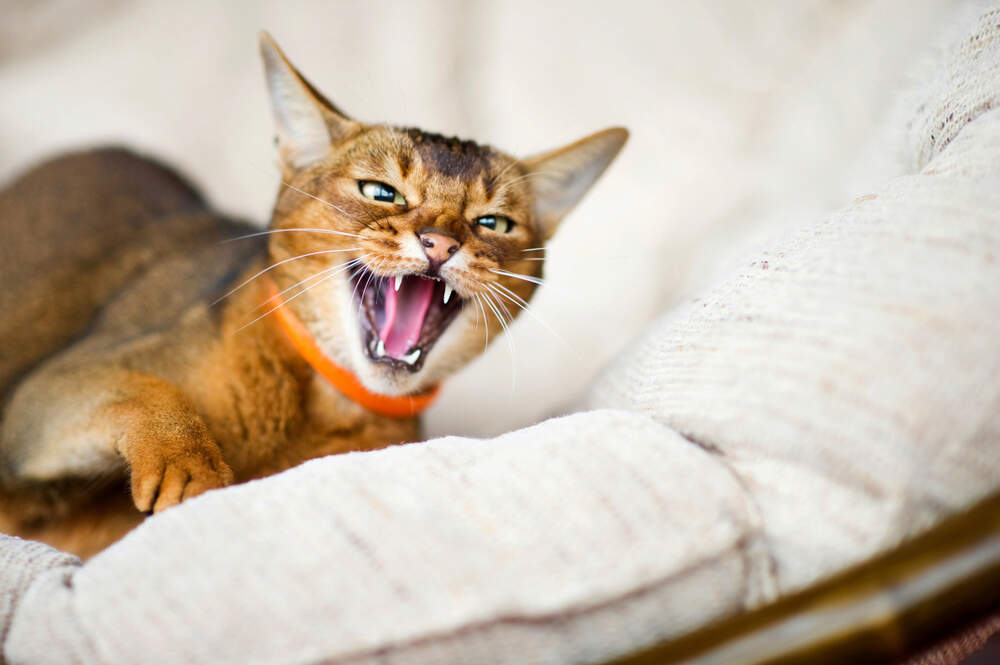If your cat has hissed at you for the first time, it’s essential to recognize that this behavior is a form of communication. Cats may hiss when they feel threatened, scared, in pain, or even when their boundaries are being pushed.
In addition, understanding the context and potential triggers behind the hissing is crucial. It’s important to respect your cat’s need for space and avoid actions that may cause discomfort. If the hissing persists or is accompanied by other concerning behaviors, consider consulting with a veterinarian or a professional cat behaviorist for guidance and solutions to address the underlying issues and maintain a positive and harmonious relationship with your cat.
Let’s explore more reasons and solutions for hissing.
What Does Cat Hissing Sound Like?

Cat hissing is a typical behavior resembling the hiss of a snake or air escaping from a tire. Feline experts suggest that cats may have acquired this hissing behavior by imitating snakes as a survival tactic in the wild.
The intensity of a hiss can vary depending on the situation. It can range from a silent, open-mouth hiss, which is more of a visual expression of displeasure, to an aggressive hiss with added spitting. Common accompanying behaviors during hissing include:
- An open mouth with a curled tongue
- Flattened ears
- Arched back
- Erected hairs, known as piloerection
Cat Hissing vs. Growling: Hissing and growling are both natural means of feline communication. A hiss is characterized by an open mouth with exposed teeth and a forceful breath out, often with a sharp stop. In contrast, growling typically begins with an “mmmm” sound, evolving into a low, sustained rumble originating from the throat.
Why Your Cat Hissed At You For The First Time: Common Reason
Territorial Behavior: They are inherently territorial creatures, and they can display territorial aggression when they feel their space is being invaded. This territorial aggression tends to be more common in male cats but can occur in females as well.
Furthermore, several situations may trigger your cat’s territorial behavior, such as the arrival of a new kitten, the presence of neighborhood cats infringing on their territory, or the introduction of unfamiliar people into your home. Additionally, non-recognition aggression, often seen when a cat returns from the vet, can make your cat hiss, as they perceive the returning it as a stranger encroaching on their territory.
Fear and Stress: Cats are highly sensitive creatures, and significant disruptions in their routine or environment can lead to fear and stress. Common stressors include moving to a new home, traveling in vehicles, adopting rescue cats, or past traumatic experiences. Hissing is a natural response for cats when they feel threatened, as they try to deter the perceived threat by appearing larger and more intimidating.
Pain: In addition, they are skilled at concealing their discomfort, making aggression a possible indicator of an underlying issue. Conditions like arthritis can lead to pain, but if your cat hisses abruptly, it’s more likely due to acute injuries, infections, or abdominal pain. It’s crucial to assess your cat’s well-being gently, keeping in mind that they may be in pain. When in doubt, consult a veterinarian.
Petting-Induced Aggression: Petting-induced aggression can be perplexing, as it might transition from purring contentedly to hissing and acting aggressively while being petted. This behavior is often triggered by overstimulation.
Moreover, they have varying limits for petting duration, and when they’ve had enough, also may hiss or gently bite to signal that they want you to stop. Recognizing early warning signs like licking your hand or tail thrashing can help you prevent overstimulation and hissing.
Redirected Aggression: Redirected aggression occurs when your cat is frustrated by an external stimulus they can’t reach or confront directly. This frustration can arise from various sources, including seeing a bird or mouse outside, hearing loud noises, encountering neighborhood cats, or smelling unfamiliar scents. Unable to address the source of their irritation, it may redirect their pent-up energy and stress toward you, resulting in unpredictable behavior.
Dealing with a Hissing Cat: What to Do?
If your cat hisses at you, it’s a sign of their distress, not hatred. It’s crucial to handle the situation carefully to prevent any harm or further annoyance. Here are steps to follow when your cat hisses:
- Stop what you’re doing: If you’re petting your cat or if something is causing them distress, like a loud noise, stop it immediately. This shows your cat you’re attentive to their feelings.
- Give your cat space: Allow it time to calm down. The duration varies from cat to cat and depends on the situation’s seriousness and your cat’s level of irritation.
- Let your cat hide: They have a natural instinct to hide when they feel stressed or threatened. It’s essential to allow them this hiding time to help them relax.
- Don’t take it personally: Remember that it isn’t hissing because they hate you. Something may have overwhelmed them, but it’s not a personal attack. When they calm down, they’ll likely return to their friendly and happy self.
If you suspect your cat is in pain, it’s important to consult a vet for a checkup. The vet can diagnose any underlying issues and provide appropriate treatment or pain relief.
Lastly, never respond to your cat’s hissing with punishment, like shouting or hitting. This can worsen the situation and harm your relationship with it. Patience and understanding are key when dealing with hissing behavior.
How To Make Your Cat Feel Less Stressed?
Helping your cat feel less stressed is important, as hissing usually comes from fear, stress, or anxiety. These emotions are usually temporary and can be managed. Here’s how you can make your cat feel more relaxed:
- Provide Essentials: Make sure it has the basics they need, like enough litter boxes, fresh water, and balanced meals. This makes them feel secure and loved.
- Environmental Enrichment:They love to climb, run, and scratch. Offer scratching posts, cat trees, shelves, and window perches in their favorite spots.
- Play and Exercise: Also, they are natural hunters, so engage in daily playtime for about 15 minutes. Use interactive toys and puzzle games between play sessions.
- Create Their Space: Give your cat a hideaway, like cat tents, cubbies, cardboard boxes, or cozy beds, where they can feel safe and secure.
- Bonding Time: Spend quality time with your furry, whether it’s sitting quietly next to them or grooming. Not all cats enjoy being picked up or cuddled, so respect their preferences.
- Use Calming Pheromones: Consider using artificial scents that mimic the calming signals cats produce. These scents can convey a sense of trust and safety to it.
- Regular Vet Visits: Ensure your cat’s well-being by scheduling regular vet check-ups. Look for a vet who is gentle and cat-friendly, as this can reduce stress during vet visits.
Why do cats hiss at each other?

Well, hissing is like a warning sign that a cat uses when they feel mistreated, provoked, scared, or uncomfortable. It’s not about teasing or taunting. It’s more like saying, “Hey, stay away from me, or things might get physical.”
Cats hiss at each other in different situations:
- A mommy with her kittens might hiss, growl, or even try to chase away another cat, even if they used to be friends. She’s just protecting her babies.
- Two male cats that haven’t been neutered (fixed) or a male cat and a female cat who hasn’t been spayed (also fixed) might hiss at each other, especially if they’re looking for a mate.
- They are very territorial, which means they like to have their own space. So, when a new cat comes into their territory, they might hiss to show who’s boss.
- When a cat comes back from a visit to the vet, other cats at home might hiss at them. This happens because they smell different, and cats talk to each other through sight, sound, and scent.
- Sometimes, they do it to avoid getting into a fight or because they think something might hurt them.
FAQ’s
Do some cat breeds hiss more than others?
Yes, some cat breeds tend to exhibit more frequent hissing behavior due to their inherent temperaments. Breeds like Siamese, Sphynx, Bombay, Bengal, Scottish Fold, Pixie Bob, Egyptian Mau, American Wirehair, Korat, Singapura, and Cymric can be more inclined to hiss than other breeds. However, individual temperament can still vary within each breed.
Why do kittens hiss?
Kittens may hiss for various reasons. They can hiss during rough play with other cats or kittens when the play becomes too intense, serving as a way to signal that it’s time to calm down. This play hiss is usually shorter and less serious than the defensive hisses of older cats. Additionally, kittens may hiss when startled by sudden loud noises, causing them to jump up and hiss with their fur standing on end.
Why do mother cats hiss?
Mother cats hiss to protect their kittens. When anyone, be it a person, another cat, or another animal, gets too close to her kittens, even the sweetest and most social mother cat will hiss as a way of maintaining a safe distance during their interaction. This hissing behavior is a natural response to safeguard her little ones.
What should I do if my cat hisses at a new kitten?
Cats may hiss at new kittens to set boundaries, especially if older cat’s limits are being tested. Socializing kittens is crucial to develop self-control and limit dominant behavior.
Why is my cat hissing at a new pet?
When introducing a new pet, make gradual, supervised interactions, and be patient. Give your cat a safe space. Hissing may continue until trust is established.
Why is my cat hissing at my dog?
Cats may hiss at dogs to establish boundaries or in response to confrontation. It can also be a territorial response when introducing a new pet to the family.
Why does my cat hiss at me?
Your cat may hiss if annoyed or in pain. Respect their boundaries and avoid unwanted actions, like trying to trim their nails or grooming them. Small children who don’t understand cat cues can also trigger hissing.
Why is my cat hissing at nothing?
Cats may hiss due to fear of new or unfamiliar things in their environment. Gradual introduction and desensitization can help them feel comfortable in their space.
Final Words:
To sum up, if your cat has hissed at you for the first time, it’s crucial to approach the situation with understanding and empathy. They communicate through their behaviors, and hissing can be a signal of discomfort, fear, or a need for personal space.
Furthermore, take the time to consider the circumstances that led to the hissing and make adjustments to ensure your cat feels safe and respected. By addressing any underlying issues and maintaining a patient, gentle approach, you can work towards rebuilding a positive and trusting relationship with your feline companion.









